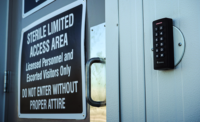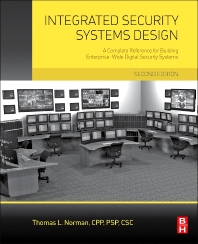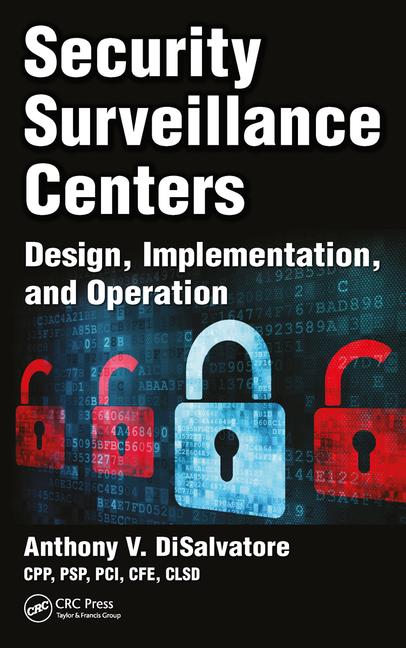Daniel Hernandez, CEO of SecurityBud, Fullerton, Calif., featured on this month’s cover, has experienced a novel’s-worth of stories since deciding to focus on the cannabis security vertical 10 years ago. He’s been paid in bags of cash, works with one of the most contentious plants in the United States and has interacted with a cast of (very chill) characters as clientele.
“It’s just different,” Hernandez says. “It’s a very, very unique industry. I wouldn’t say [issues to the vertical are] specific, I would just say they’re heightened and concentrated.”
According to BDSA, a cannabis research market firm, the cannabis market has estimated sales of $31 billion for 2021 (an increase of 41 percent over 2020) in the United States alone.
There is great opportunity to capitalize on the cannabis industry’s rapid growth. As the industry continues to mature, so does the demand for sophisticated physical security solutions to protect customers, employees and assets from seed to sale.
“Cannabis represents one of the biggest opportunities for the security industry that we’ve had in years.”
— Allan Smith, SightLogix
“Cannabis represents one of the biggest opportunities for the security industry that we’ve had in years,” says Allan Smith, director of cannabis sales, SightLogix, Princeton, N.J. “Much of the opportunity comes from the ‘seed to sale’ approach employed by many cannabis firms, with multiple facilities under one company umbrella; so once you have established yourself as a trusted expert, you can really go wide with comprehensive solutions across multiple divisions.”
And, depending on how quickly state and local governments move to legalize and regulate the cannabis industry, there are many opportunities for integrators who can tap into this market.
Despite the vertical’s rapid growth, it remains federally illegal and stigmatized. However, that doesn’t mean cannabis facilities need to be barred from getting the protection they deserve.
“They deserve the security that any other organization that handles a lot of cash should be provided with,” says William Plante, director, enterprise security risk group, ADT Commercial, Boca Raton, Fla.
While it might seem like a completely new horizon, security integrators can take their knowledge from protecting other verticals and apply it to the cannabis space in new, inventive ways.
“A lot of people try to take the old-school standardized approach — aerospace, maybe enterprise-level stuff — but most the time, they’re missing specific key areas,” Hernandez says.
With chance to apply access control technology, video surveillance, perimeter security, analytics and more, the cannabis vertical allows integrators to increase their green by getting into a booming industry that’s set to continue to grow in the future.
It Isn’t Easy Growing — or Securing — Green
As long as cannabis remains federally illegal, dispensaries and cultivation sites cannot use traditional banking, making it a cash-heavy industry. Plus, most get initial capital through private investments, since banks are FDIC-insured, and credit unions are insured through the NCUA.
“Until cryptocurrency becomes very paramount, we’re stuck with that federal banking system.” says Steve Surfaro, chairman, public safety working group, Security Industry Association, Silver Spring, Md. “So in a lot of cases, business is still done with coins and cash.”
Those opening a dispensary or cultivation site have a greater challenge in finding the crux between cost and quality since they cannot use a bank loan to pay for their security system.

Integrators even need to be conscious about the kinds of lighting used in their security systems design, as cannabis is a delicate plant.
IMAGE COURTESY OF WASHARAPOL D. BINYO JUNDANG
“We have to find cost-effective ways that we can do this, while still hitting the marks of the regulations, and putting in an effective system that’s going to protect them,” says Ron Stein, account manager, Dagostino Electronic Services, Pittsburgh.
Each installation and design for each facility will be different because of the regulations on the state — and even municipal — level.
“No two cannabis facilities are exactly alike,” says Barry Chisholm, director of sales, American Alarm, Arlington, Mass, which, since 2015, has helped more than 90 cannabis facilities open in New England, including cultivators, retail outlets, product manufacturers, transporters and cannabis testing labs. “Each host community has its own characteristics. The local and state permitting processes are lengthy and subject to intense reviews and inspections. For a cannabis facility to successfully navigate that process, a properly designed, installed and commissioned integrated security system is required,” he adds.
“Despite its significant and almost exponential growth over the last few years, it’s still a highly fragmented industry,” adds Sean Foley, senior vice president, Interface Security Systems, Earth City, Mo. “These folks are still finding their way.”
Theft — from both inside and outside of the business – is one of the biggest security issues in the vertical.
“Whether it is a dispensary or grow facility, both money and inventory can be easily slipped into a pocket by an employee,” says Blake Albertsen, regional sales manager, Salient Systems, Austin, Texas.
In fact, many assets of retail security, like loss prevention, are used in dispensaries.
“Perhaps … a particular consumer always goes to …[ a very specific bud master or a very specific salesperson,” says Eric Hess, senior director of product management, SAFR at Real Networks, Seattle. “You start to think, ‘Is there potentially a relationship between the two and you have a partner activity going on?’”
And it’s not just the indoors that need protection in this vertical.
“If someone can get over a fence during the cover of darkness, they’ve basically gotten right into the money — there are no doors or windows to slow them down and they can cause significant loss in terms of materials and company prestige,” Smith says.
The cannabis vertical also has stigma connected to it because of its federal status.
“There are some security manufacturers that will not sell to any medical cannabis facilities because it is not approved federally,” Surfaro says. “I have actually had two IP camera manufacturers say that they will not come out with specifications for medical cannabis or dispensaries, as long as the federal government does not approve it because we’re essentially breaking the law.”
Operational pitfalls remain as well, with security integrators needing to pay attention to who they’re doing business with.
“There is likely to be high turnover in the cannabis retail space for the foreseeable future, with lots of consolidation,” says Bill Hobbs, vice president of global sales, 3xLOGIC, Fishers, Ind. “It’s important to be aware of this and also ensure you’re dealing with reputable businesses.”
Not only must integrators protect product, people, the outdoors and cash, but protecting digital information is also a concern, especially in states where medical marijuana is legal and delicate information is kept on file.
“The importance of cybersecurity for medical dispensaries that need to meet the Health Insurance Portability and Accountability Act (HIPAA) requirements cannot be underestimated,” says Jason Burrows, Western sales director, IDIS America, Coppell, Texas. “They also need to ensure the secure access, transmission, and storage of data to protect the privacy of all their customers.”
How to Get Into the Cannabis Vertical
According to the integrators interviewed for this story, networking is one of the most important steps an integrator can take to break into this vertical.
“I built a lot of relationships with a lot of people that have been in this business a long time,” Daniel Hernandez of SecurityBud says. “That’s something that’s really hard to gain overnight. Don’t come in thinking you’re going to teach the cannabis industry a lesson.”
Many mentioned that meeting with cannabis facilities in the early stages of their license application helped these integrators break into the vertical.
“We go out and help them from the ground floor while they [are] applying for their licensing,” says Ron Stein of Dagostino Electronic Services. “During that period, they really have to illustrate within their application what the security systems are going to look like. We are able to provide them with the security drawing and help them create their narratives to help them get all the points available for the security portion, because that is a huge part of the application.”
Learning by example is another way to learn the ins-and-outs of cannabis security.
“Just getting a specification from the state is not going to help you,” Steve Surfaro of SIA says.
“You’re going to have to take a look at some of the facilities that have been built, and then look at the customer’s expectations, their own operation and where they want to go.”
All agree that knowing the regulations is the most important part.
“Integrators should educate themselves on the unique needs of cannabis businesses, which aren’t like other retailers,” Chris Jensen of March Networks says. “They have very specific security needs, and integrators who can meet those needs stand to gain the most business. One aspect to focus on is compliance. This is key as regulatory bodies are constantly advancing regulation standards.”
Working with a manufacturer experienced in cannabis security can also help with breaking into the vertical.
“The best way for an integrator to get into this market is by teaming up with a manufacturer that already has inroads within the cannabis industry and whose technology already has features and functionality that solves a cannabis pain point,” says Blake Albertsen of Salient Systems. “While integrators don’t need a specialized license to work in this space, they will need to be familiar with the many regulations of this industry to ensure their success.”
Regulations in the Vertical
The cannabis vertical wasn’t always thinking so concretely about security or hiring professional security integrators, and many initially relied on ad hoc security systems, says Bryan Grenon, director of critical infrastructure, ADT Commercial.
“It wasn’t really a professional, comprehensive, quality system that provided that level of protection that they need for their own safety,” Grenon says.
Now, the regulatory burden for those working in the cannabis industry is great, and regulations vary from state to state. Video surveillance requirements differ from one jurisdiction to another.
“That can cause some conflict and confusion, just as far as interpretation of implementation,” says Kevin Brown, business development manager, cannabis, Hanwha Techwin America, Teaneck, N.J.
According to Smith, there is a parallel to another industry.
“It’s not that different from a fire code, where you might have a good sense of the state rules, but a local inspector may interpret them differently,” Smith says. “A common regulation is that facilities must keep 24/7 surveillance with no obstruction to any doors, registers or people.”
One constant, however, is the necessity of having a compliant system in order to qualify for a license and keep it. Those who are not in compliance can be fined, lose their license or both, meaning there’s a lot on the line.
 Security system setting. | Getty Images
Security system setting. | Getty Images“If plants get moved to an area that’s not secure, the state can come in and make them burn their entire crop,” says Scott Thomas, director of U.S. sales for signature brands, retail, financial, hospitality, gaming and cannabis, Genetec, Montreal, Canada.
Requirements usually apply to camera types, video resolution, frame rates and camera placement. Most jurisdictions specify when and where video needs to be recorded, how long it has to be kept and if it has to be backed up. Some areas also require specific functionalities, like Illinois, which requires clear identification of license plates, faces, and point-of-sale monitors.
“We’ve seen from 45 days, all the way up to four years of required storage,” Dagostino’s Stein says.
However, it’s expensive to hold all of that video on-premise.
“We have seen some of our customers do a hybrid system where they store footage for 30 days on-prem and then store the rest up to the cloud to meet the regulatory requirements of that particular state,” Thomas says.
“This is where a skilled security integrator can really help with system design,” adds Chris Jensen, cannabis market manager, March Networks, Ottawa, Canada.
Resources for Regulations
Thinking about cannabis security regulations may be headache-inducing, but there are resources available to make it easier to traverse them.
The Security Industry Association updated its “SIA Guide to Cannabis Security Regulations” in September 2021 to reflect new state summaries; information on legal sales and regulation coming to Connecticut and Montana in 2022 and Virginia in 2024; and analysis of the impact on 2020 elections on cannabis policy. The guide includes an overview of state laws regarding cannabis, including which states have legalized and/or decriminalized marijuana for medicinal and/or recreational purposes and a detailed table marking the legal status of cannabis in each state.
Additionally, some manufacturers themselves have released whitepapers or published released blogs about securing cannabis facilities.
Ron Stein, Dagostino Electronic Services, Pittsburgh, says going right to the source is often the best way to figure out regulations.
“Because they’re constantly being updated, find out which department is in charge of [cannabis regulations] within the state,” Stein says. “So just to give you an example, in Pennsylvania, it’s the Department of Health.”
Cannabis Vertical Technology
Many of the solutions used in the cannabis vertical are ones that integrators are familiar with and use frequently, like intrusion systems and basic access control solutions in offices, storerooms, and safes where the money is kept.
“Inventory costs are extremely high in the cannabis industry and since internal theft is the most prevalent security issue, surveillance ends up being a critical security investment,” Salient’s Albertsen says.
Hernandez says there are three kinds of solutions most important to the security design of a cannabis facility.
“We try to do the trifecta, which is access, intrusion and surveillance,” Hernandez says.
IP cameras, network recorders, and video management software are some of the basic physical security technologies most commonly deployed, with a security-as-a-service solution easily managing it all, adds March Networks’ Jensen.
“Not only does this allow for faster deployment, less in-house maintenance work, and flexible payment options, it can also include other benefits if you choose the right provider,” he says. “For example, video can be integrated with point-of-sale transaction data and analytics for exception reporting and business insights. This can help cannabis businesses with loss prevention and gathering business intelligence, depending on the analytics and software chosen.”
In fact, analytics are becoming not just an add-on, but a necessity.
Smith says, “Not only do cannabis producers need systems like these to prevent loss; some states may now or in the future require growers, storage facilities, processors and dispensaries to implement video analytics to detect intruders,” Smith says. “This is why a lot of cannabis companies and the security dealers that serve them are turning to smart thermal solutions — they detect intruders outdoors with high reliability, they work in the dark, daylight, and bad weather, and can blanket even a large outdoor grow site with automated awareness.”
Cloud, like the rest of the industry, is another major trend in this vertical.
“Cloud is a big one that people are starting to migrate to,” says Ryan Juckett, account executive, Convergint, Schaumburg, Ill. “The less hardware they have to have on-site and maintain, the better.”
And, for those looking to break into the vertical, providing systems design services can be a win-win for everyone.
“Many states are also turning to a lottery system for awarding licenses, and these applications are based on points, with a section for security,” Smith explains. “The higher the score in this area, the better chance of licensing approval.”
Camera-wise, National Defense Authorization Act (NDAA)-compliance, Trade Agreements Act (TAA) terms and manufacturing origin are also becoming increasingly important, particularly for medicinal cannabis as cannabis firms are likely to have received federal funding for research and development of product that could produce game-changing advances in the treatment of a wide array of diseases and ailments.
“In both retail and at cultivation sites, using wide-area cameras with exceptional, triple-side de-warping and advanced PTZ controls allows for smooth and intuitive panning, tracking and zooming with ease and accuracy — even via mobile devices — [and] delivers optimum results,” IDIS America’s Burrows says

There are many kinds of products that need protected in cannabis dispensaries, like oils, tinctures and vape cartridges.
IMAGE COURTESY OF KINDEL MEDIA
Cannabis delivery is also becoming a trend, widening the kinds of solutions that can be used.
“Some state legislation is now requiring delivery drivers to wear a body camera anytime they are outside of their delivery vehicle (which is also required to have cameras) and to record all transactions,” Jensen says.
According to Genetec’s Thomas, even alarm monitoring has a place in the cannabis vertical, with those with multi-site operations beginning to build and develop their own security operation centers (SOC).
“The reason they’re doing this is because they can more effectively monitor all of their sites from a regulatory standpoint; but there’s a cost reduction versus third-party alarm monitoring,” Thomas says.
Parts of banking security are even seen in the vertical, since regulations determine what kinds of safes can be used.
“Wherever the cash is going to be, we like to have that whole room lined with mesh so it can’t even be cut into,” Hernandez says. “Proper vault doors are always another plus.”
Amber Mayes, vice president of sales and marketing at QTS, Tomball, Texas (a pneumatic tube and security solution provider), says the company entered the cannabis vertical after noticing the declining need for bank security with the rise of mobile banking. Although some view the cash-heavy nature of the industry as a burden, Mayes saw it as an opportunity, providing cannabis facilities with safes and vaults, along with cash recyclers.
“Instead of them having a cash drawer or a register, they will have a cash recycler that they can take out money whenever they need it,” Mayes says. “Whatever cash the customer gives to the operator goes right back into that safe and every bit of it is secure. Nobody can essentially open it.”
Advice for Budding Cannabis Integrators, From Cannabis Integrators
SDM asked, “What advice would you give other integrators about working in this space?” Here is what they said:
“They’re a close knit group. So if you’re able to help one of them, that word spreads throughout the state that you’re helpful as an integrator.”— Ron Stein, Dagostino Electronic Services
“Be prepared for long sales cycles and intense regulatory scrutiny on design and installation.” — Barry Chisholm, American Alarm
“For one, security regulations for cannabis licensing vary across the country. So, an integrator looking to enter this space might want to focus on a specific state to gain mastery of the local regulations — although security best practices will go a long way to meeting the spirit of the regulations.” — Allan Smith, SightLogix
“The key to taking advantage of opportunities in the cannabis industry is to really focus on it. Security integrators need to be all in or all out. Regulators are often checking in to make sure facilities are meeting all the imposed regulations, and integrators that only dabble in this market will struggle to follow and understand those mandates. Integrators that focus on the market will understand regulations and the needs of their clients’ and will find themselves more successful than those who do not.” — Blake Albertsen, Salient Systems
“Just try to do awesome, amazing work, because that’s what this space needs.” — Daniel Hernandez, SecurityBud
The Future Looks Green
The opportunity for security integrators in the cannabis vertical is continually growing — no pun intended.
“When you look at the United States, reflecting the legal reality of cannabis today, there are really only a handful of states left where it isn’t legal in some form or fashion, whether it’s medical, recreational or is decriminalized,” Juckett says.
It’s just a matter of when legalization happens.
“The big question is always federal decriminalization; when that happens, the market will go crazy, as cannabis businesses will be able secure financing to grow and invest in their organizations,” Albertsen says.
“They want unified platforms; they want integrators and solutions that they can have across states nationwide,” Interface Security’s Foley adds.
According to American Alarm’s Chisholm, the biggest potential change on the horizon would be federal law changes that either fully legalize recreational use of cannabis or decriminalize it sufficiently to allow federally chartered banks to do business with cannabis companies without any sanctions.
“We expect there will eventually be consolidation as the market matures, which could impact growth rates of this sector,” Chisholm adds.
And, when cannabis is legalized on a federal level and the regulations become more universal, working in the space will become even easier.
“As security integrators, I think a lot of us go into this business looking to be able to protect people and property, and it’s nice when you can do it for a business that’s also doing the same thing.”
— Ron Stein, Dagostino Electronic Services
“If everything goes completely legal, then cannabis security could inevitably dwindle down to what something like a brewery requires, where nothing is required technically, except for maybe some FDA stuff,” Hernandez says.
The sites that have been operating for many years will transitioning to newer systems — and even new states.
“When the cannabis industry first boomed, many facilities bought a basic security and surveillance system to meet the licensing and regulatory approvals to open their doors,” Albertsen says. “The industry is also becoming more corporate and many larger companies are buying out the mom-and-pop stores and grow facilities.”
Along with being a viable vertical for years to come, the cannabis industry is an excellent space to pursue if you want to feel that sense of purpose of what you’re doing, according to Stein.
“There are studies that show that these communities that have an active medical marijuana program have reduced their opioid deaths and overdose deaths by 25 percent,” Stein says. “As security integrators, I think a lot of us go into this business looking to be able to protect people and property, and it’s nice when you can do it for a business that’s also doing the same thing.”










